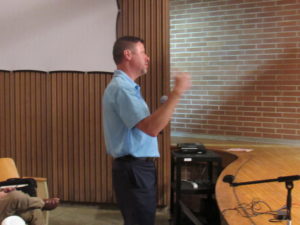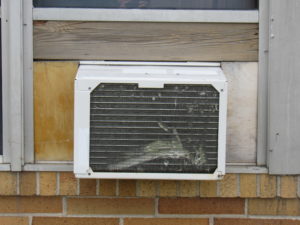By Harold C. Ford
For the second time in the just-started 2021-22 school year, Flint Community Schools (FCS) closed its doors to students due to the heat. This time it was by order of the FCS Board of Education.
By a vote of 5-0, the Flint board closed its schools Aug. 19 in anticipation of outside temperatures that would reach the mid-80s (Fahrenheit). FCS buildings were closed on Aug. 12 by the FCS central administration for the same reason.

FCS Administration building. (Photo by Tom Travis)
Two board members—Diana Wright and Vera Perry— were absent from Wednesday’s four-hour regular board meeting. They also missed last week’s 3.5-hour Committee of the Whole meeting Aug. 11.
Following the board meeting, which adjourned at 10:30 p.m., FCS Superintendent Anita Steward issued a public statement with a late-night posting on the district’s website that read, in part:
Return to school date uncertain
Although Steward announced an Aug. 23 return to school for students, that seems uncertain as board members looked for ways to keep students home until cooler temperatures prevail.
Such a move, however, would require negotiating a new calendar with the district’s three employee bargaining units — the United Teachers of Flint, the Congress of Flint School Administrators, and Service Employees International Union Local 517 (paraprofessionals).
“That’s a negotiable item with the bargaining units,” advised Ayunna Dompreh, FCS executive director of finance.
The board voted 4-1 to reopen discussions with the FCS unions about the school calendar. (It was uncertain which member cast the dissenting vote as FCS Board President Carol McIntosh abandoned roll call votes throughout the meeting.)
“Unbearable”
The board’s newest member, Adrian Walker, said he had heard the complaints about the heat. He reported on his subsequent visits to Brownell STEM Academy and Holmes STEM Middle School Academy this past week.
“It’s just unbearable,” judged Walker. “There’s no way you can learn in that environment.”
Dan Mack, an account manager with Johnson Controls, a company that is attempting to upgrade the HVAC (heating, ventilation, air conditioning) systems at FCS buildings, agreed with Walker’s assessment.

Dan Mack, Johnson Controls account manager, addresses Flint school board (Photo by H. C. Ford)
“It’s difficult to learn in that environment,” Mack told board members. “I couldn’t do it.”
“What can we do to make it right for our babies?” asked Marlis Settle, an attendance agent at Brownell. “Our children are suffering from the heat.”
Nearly in tears at times, Settle told board members she wrapped bits of ice in paper towels and distributed them to students looking for relief from the heat. She also reported that bottled water provided students was warm due to lack of refrigeration.
Settle reported that some teachers shut ceiling lights off in attempts to lower temperatures in their classrooms. And use of window air-conditioning units often caused electrical circuits to break, the result of an aging electrical infrastructure. Further, noise from the use of fans made teaching difficult.

Window air conditioner at a Flint school building; 110 classrooms still need these units. (Photo by H. C. Ford)
“They can’t learn,” Settle said. “I would prefer for us to keep them babies out ’til Labor Day.”
Lost school days
Board members inquired about the number of lost instruction days allowed by the Michigan Department of Education (MDE) before they would have to be made up. Some suggested that FCS could just sacrifice some of those days due to heat.
Steward told board members that the Michigan Department of Education allows each school district six days before they would have to be made up. “We get six days that are forgiven,” Steward said.
FCS has already used four of those “forgiven” days and was about to use its fifth.
FCS has now cancelled classes two days due to the heat. On three other days, a minimum level of 75 percent student attendance was not achieved. Thus, five of six days allowed by the MDE have already been used; after six days the district would have to make up days or lose state aid.
“We might have to do virtual learning,” said Joyce Ellis-McNeal, the board’s assistant secretary-treasurer.
Steward advised the board that, following the unusual 2020-21 school year altered by the COVID pandemic, the MDE no longer allows a blanket option for virtual learning for an entire school district. She told the board she would explore the possibility of a virtual leaning exemption with the MDE. Otherwise, districts are now allowed a single school day for districtwide virtual learning.
Balanced calendar
Danielle Green, board secretary, advised a pause in the balanced calendar which starts the school year earlier, finishes later, and features more frequent breaks, intersessions, during the school year.
Flint schools are in the third year of balanced calendars after the concept was adopted for the 2019-20 school year.

Doyle-Ryder 1st grade teacher Kim Montini speaks to her class on Opening Day as they sit at their desks eating breakfast which is provided every morning. Montini has taught on the FCS district for 26 years and taught at Doyle-Ryder for five years. (Photo by Tom Travis)
Many advantages are cited by proponents of the balanced calendar, notably lessening summer vacation learning loss for economically disadvantaged students.
The national trend is toward balanced calendars. As early as Oct. 2014, Education Week reported “The number of public year-round schools increased by 26 percent, to 3,700 from 2006-07 to 2011-12 …
Nonetheless, a balanced calendar also means that students will be in classrooms during the warmest months of the calendar year. Flint’s high temperatures average 80 degrees in August, according to U.S. Climate Data.
Prior to becoming the first school district in the state to adopt a balanced calendar in 2013-2014, Flint’s immediate neighbor to the north, Beecher, proactively provided funding for climate control systems in its buildings.
What happened in Beecher did not happen in Flint, a system beset with aging infrastructure and financial shortcomings.
Mack cautioned board members that December 2021 is the earliest completion date for HVAC upgrades to provide air-conditioning to all FCS buildings. “Unfortunately, we will not have air-conditioning units completed this year,” advised Mack.

A Freeman Elementary adjusts his mask. (Photo by Tom Travis)
It’s not just a matter of installing AC units. “Electrical service is still an issue,” Mack said.
An aging infrastructure derailed Steward’s plans to put window AC units in the 110 classrooms that do not have them. Aging electrical infrastructure and the cost and labor for needed ventilation made that plan impracticable.
“Every time we come up with a thought, we get a roadblock,” said a chagrined Steward. “I’m trying to do what I can to cool off these classrooms.”
Despite their noise, Steward said the district may purchase large fans for the hallways and classrooms.
“Putting the kids at risk”
“My concern is we’re putting the kids at risk,” Ellis-McNeal said. “We cannot sit here and pretend we do not have an emergency situation.”
“We can’t keep subjecting people to this type of treatment,” McIntosh agreed. “We haven’t fixed our issue and our kids are suffering.”
EVM Education Beat reporter Harold Ford can be reached at hcford1185@gmail.com.


You must be logged in to post a comment.